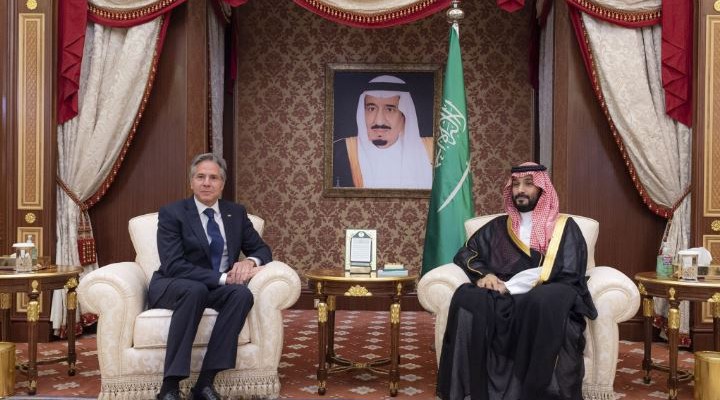Blinken’s normalisation delusion

Iran-Gulf rapprochement is shattering US and Israeli dreams
Anyone hearing the statements being made these days by US officials — especially Secretary of State Anthony Blinken — about Washington’s stepped-up efforts to normalise relations between Saudi Arabia and Israel could be excused for thinking they inhabit a different planet. They seem completely oblivious to the radical changes sweeping the region, especially the accelerating momentum towards ending US political and military influence in the Middle East and especially the Gulf.
Addressing Zionist lobbyists in Washington on Monday, Blinken declared the US “has a real national security interest in promoting normalisation” between Israel and Saudi Arabia. “We believe that we can – and indeed we must – play an integral role in advancing it,” he said, adding ” we remain committed to working toward that outcome, — including during his current visit to Riyadh.
This was part of a speech in which Blinken reiterated the US’ unstinting support for Israel and warned that “all options are on the table” to prevent Iran from developing nuclear weapons.
The most eloquent rejoinder to these optimistic delusions came in the form of four developments in the past few days that will have shocked and horrified the US and Israel, and Blinken personally.
— The announcement by Iranian navy commander Admiral Shahram Irani that his country and four Gulf states -(Saudi Arabia, the UAE, Bahrain, and Qatar) plan to form a naval alliance that will also include Pakistan and India. (Oman signed a naval treaty with Iran years ago).
— Tuesday’s reopening of the Iranian embassy in Riyadh at a ceremony attended by senior officials from both sides including Ambassador Alireza Enayati, a high-ranking diplomat whose appointment reflects the extent of the bilateral interests involved.
— Confirmation that Saudi Foreign Minister Prince Faisal bin-Farhan will visit Iran in the next few days to discuss strengthening trade and security ties and formally invite President Ebrahim Raisi to Riyadh.
— The signing by Saudi Arabia and Russia’s energy ministers of an agreement to bolster their ‘OPEC+’ deal by cutting oil production in order to maintain fair prices. The move led to an immediate rise in oil prices and belied Western press reports about oil-related disagreements between Riyadh and Moscow.
These developments, which were not out-of-the-blue or unexpected, are obviously bad news for the US. The planned naval alliance, in particular, makes redundant all US and European claims about protecting the Gulf states from an Iranian threat, or any justification for maintaining a massive naval presence in the region and large military bases in Bahrain, Qatar, the UAE and Kuwait.
Henceforth, the countries of the region will rely on their own navies and militaries to safeguard the security of their territory and waters. They no longer need to be subjected to US extortion. The Iranian ‘bogeyman’ has become an ally, the Sunni-Shia sectarian rift which the US exploited for decades is being healed, a historic reconciliation has been achieved, and a strong new partnership is being built on a solid basis.
I confess I did not expect the Saudi/Gulf reconciliation with Iran to develop so rapidly. It shatters Netanyahu’s dream of turning the so-called Abraham Accords into an Israeli-led military and security alliance, and the Gulf region into a massive market for Israeli arms, especially the Iron Dome and David’s Sling systems — whose failings were exposed by the resurgence of Palestinian resistance, along with the myth of Israeli ‘exceptionalism’ in security expertise.
Now there is to be a naval security alliance between Iran and its Gulf neighbours. Next, we could have an industrial and military-industrial partnership involving the exchange of expertise and technology, including in the nuclear field. After that, joining forces in a single front to confront and terminate Western hegemony over the region and the common enemy Israel.
Blinken would be well advised not to go too far in committing to normalisation between Saudi Arabia and the occupier state. He would do better to try to preserve his own country’s normalisation, presence, and alliances in the region, at a time when most states of the Middle East — including Saudi Arabia and the UAE — are flocking towards the BRICS grouping, the Shanghai treaty, and the new world order led by China and Russia. But the US’ overbearing arrogance ensures he will neither listen to nor act on that advice.
https://www.raialyoum.com/blinkens-normalisation-delusion/
 TheAltWorld
TheAltWorld 
0 thoughts on “Blinken’s normalisation delusion”